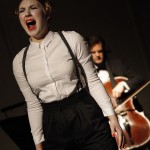 By Rebecca Schmid
By Rebecca Schmid
A saying goes that where words stop, music begins. Trite as this may sound, The Red Heifer, a one-act opera by Iván Fischer which made its German premiere at the Konzerthaus last week, serves as a powerful example. As a reaction to right-wing politics in modern-day Hungary, Fischer’s home country, the work speaks through a mixture of forewarning, humor and spirituality without ever banging its audience over the head.
A range of musical pastiche serves to illustrate a true story about accusations in the late 19th century that a Jewish community in North Hungary had murdered a young girl and used her blood for ritual in synagogue. As seen June 29, the narrator (Jozsef Gyabronka) recites his text to accompaniment directly evoking J.S. Bach’s Passions, while the loud-mouthed hostess of a hotel-restaurant called The Red Heifer (Orsolya Sáfár) breaks out into a bel canto idiom above the chanting of her male admirers.
Both the montage-like structure and the didactic nature of The Red Heifer place it straight in line with a tradition of Weill-Brechtian theater which Fischer, as he explained in a moderated discussion, was inspired. In what could easily lend the work to performance in schools, the conductor casts children in the roles of the victim, Eszter (Kyra Varg), and the young Jewish boy, Moric (Jonatán Kovács), who betrays his community to give a false testimony.
Fischer here has the protagonist spit his words above a rollicking orchestra while a group of children cheer him on with soccer-inspired patriotic regalia and blast plastic horns that, appropriately, evoke cows (a red heifer is a young cow that appears in the Book of Moses). Faced with a lack of other witnesses, the judge (Jozsef Csapo) ultimately pardons the synagogue, and Moric—sitting on the train with his father, presumably in order to flee—has a vision of a red heifer through which he is purified from sin.
Above a snare drum which recreates the rhythm of the locomotive, a reprise of the pseudo-devout melody sung by the men of the Jewish community after the courtroom verdict explodes into a desperate plea, only to find resolution in a winding violin melody with hints of Mozart’s Requiem.
The wide musical palette, even if it doesn’t blend into a consciously personal style, only serves to underscore the tensions in the story, from folk dance to string trio and cimbalom to a jazzy number for Moric’s father (Tamas Altorjay). And Fischer reveals himself a fertile mind of melodic invention as he spins off the various sounds of Hungarian tradition, both high and low.
The production emerged with a mix of unaffected directness and professional polish, thanks to strong characterizations and musical delivery of the both the child actors and opera singers on stage. Fischer drew sensitive but vigorous playing from an ensemble mixing players from the Budapest Festival Orchestra and the Konzerthausorchester Berlin.
Macbeth
Around the corner, on the construction site of what will be the multi-million Euro renovated Staatsoper Unter den Linden, Intendant Jürgen Flimm brought the season to a stirring close with his own new production of Sciarrino’s Macbeth. As seen June 28, a war zone covered the concrete floor of what was and will be the intendant’s headquarters, period costumes merging with 18th-century architectural details such as a fireplace which is lit by a victorious Macduff at the end of the opera.
The staging–which consists of little more than a small pool of water for Macbeth to wash his hands; a pile of rugs; and period furniture–takes on a surreal quality that only heightened the ghostly whispering and wilting tremoli of the score. With the death of Banquo and the appearance of his ghost in the Second Act, the chorus of Voci (voices)—now furies, now monks scattering ashes after Macbeth’s decapitation—change into costume as towering demons, haunting the unfinished bowels of the opera house.
The atmosphere was more than rife for the orchestra’s quotation of the Commendatore’s return in Mozart’s Don Giovanni—here accompanied by red light and smoke—followed by an aria exalting “la patria” (the homeland) from Verdi’s Un Ballo in Maschera. The moment is so climatic, however, as to make Sciarrino’s palette in the final act grow static (unlike in his shorter works Infinito Nero, Vanitas or Lohengrin).
The libretto, meanwhile, bypasses the prophecy of the three witches to plunge into the violence and insanity around Macbeth, a nightmare from which he can’t escape. By placing the audience on either side of the action, Flimm brings the spectator uncomfortably close to the raw human brutality (one woman had to be escorted out as Lady Macbeth washed her husband’s hand with a rag soaked in fake blood after Duncan’s murder).
The disembodied tones of the score nevertheless created a powerful sense of suspended reality which was heightened by having part of the ensemble, Opera Lab Berlin, placed outside the room to create a phantom-like ricochet. David Robert Coleman led with precision but also elegant musicality. Alongside Otto Katzameier in a potent portrayal of the title role and Carola Höhn as the hysteric Lady Macbeth, baritone Timothy Sharp, tenor Stephen Chambers and the small chorus maintained sharp dramatic focus, even if Italian diction could have stood improvement.
